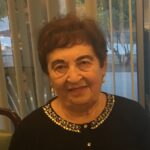
Zorya Rappoport, z"l (Ukraine)
I was born in 1926 in Tulchyn, Ukraine. My parents were Nehoma Bramarova and Yakov Rappoport, and they met while attending the Moscow Communist Institute. They’d both been sent there for training, my father from the ranks of the Red Army and my mother from the factory where she worked. After they graduated, they both worked as political science teachers. I was their only child. When I was nine, my mother was sent to work in Odessa, Ukraine, at the Institute of Agriculture. My father worked at a Polytechnic Training College. In 1937, he became a victim of the repression under the political penal code (there were many at that time).[1]
I was in the 7th grade when World War II began on June 22, 1941, and by June 23 the Germans were already bombing the city. We had to spend that night in bomb shelters. That same year, they released my father after five years imprisonment, though he was not permitted to live in big cities. He left for Central Asia to the city of Andijan, where he found work as an engineer.
The bombing intensified, and my mother decided we should leave. Many Odessans left on foot towards Nikolayev, so we decided to join them. After a few hours, Red Army soldiers stopped all the refugees because the Germans had already taken Nikolayev and were moving for Odessa. My mother decided to go to the port with the hope that we could board a ship carrying refugees out. We arrived at the port just as German airplanes started shooting at people on the shore with machine guns. We hid under an upside-down boat, and so we survived.
When the bombing was over, we went to a large ship with a long line of people trying to evacuate. Among them was one of my mother’s classmates, who recognized her. He had tickets that were given out for evacuation, and because his family was big we went through as members of his family. That was a lucky coincidence.
The big ship was “The Dnepr,” carrying injured soldiers and evacuees from Odessa. On the way to Novorossiysk, the ship was attacked from the air; a fire started right where all the evacuees were located. We had already given up hopes of surviving, but luckily a team of sailors was able to put out the fire. After three days we arrived at Novorossiysk.
We then traveled to join my father in Andizhan (Uzbekistan). Along the way we survived hunger and sickness, but at last we reunited with him. My parents worked at a tractor factory, where my father was an engineer and my mother distributed tools. At that time in Uzbekistan, we felt no forms of anti-Semitism. I graduated from the 10th grade in 1944 with straight As, and sent an application to the Odessa Medical Institute.[2] I was accepted without having to take entrance exams. It was still war time, but they sent me an invitation to study. In September 1944, I went to Odessa, where I lived in a student dormitory.
We celebrated Victory Day on May 9, 1945, in Odessa; there was universal jubilation, music and dancing at the city’s central park.
After I graduated from the institute, I went to Tashkent, where my parents had moved. I took specialized courses in neurology there, after which I worked as a neuropathologist in a large clinical hospital. I really began to feel like a Jew in post-War Uzbekistan when I was not accepted into the neurosurgery institute.
I got married in 1949. I have two children, a son and a daughter. In 1967, I was appointed as the head of the department of Neuropathology and worked in this position until 1992. Our son graduated from a polytechnic institute and worked as a computer programmer. His boss wanted to promote him, but they did not because he was Jewish. In 1989, my son decided to leave the Soviet Union, moving to New York with his wife and young son.
In Tashkent in the 1990s, Uzbek nationalists made their appearance. Posters hung on the streets said, “Jews – go to Israel!” “Russians – go to Russia!” We began to feel anti-Semitism more often at work. Because of this, our family – my husband, his 93-year-old father, our daughter with her husband and two sons – decided to leave the country. Our son sent us documents from America, and in 1992 we moved to the United States, to the city of Tucson.
Only in America did we become real Jews – we go to synagogue now and observe all our holidays.
The fate and fortunes of our children and grandchildren in America have turned out well, since in this country Jewish people are equal to others.
[1] This refers to Stalin’s Great Purge of the 1930s.
[2] Before 1990 the course of school training in Soviet Union was 10 years.
